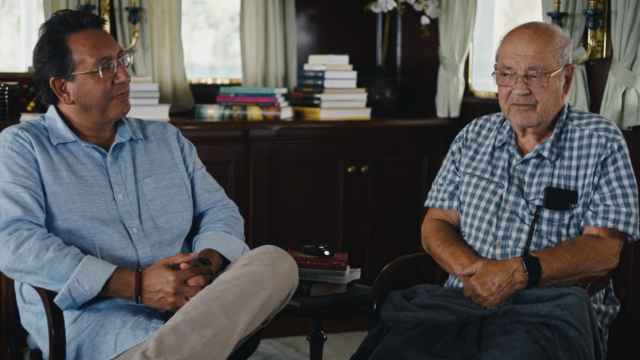But for every artist memorialized in some way, there are dozens more whose traces are harder to find. I recently went out, armed with a camera and a few old address books looking for hidden treasures. I found plenty.
My favorite, I think, was a modest building that bears the address of 8 Vtoraya Peschanaya Ulitsa. It is a clean, neat building located across from a large and attractive park well north of Moscow city center, on the west side of Leningradsky Prospekt. For a time the street bore the name of Romanian politician Gheorghe Gheorghiu-Dej and that is who the street was named after when Yury Trifonov lived here in the 1970s.
When Yury Trifonov lived in this building in the 1970s the street was named after Romanian politician Gheorghe Gheorghiu-Dej.
Trifonov was the author of some of the finest novels and stories written in the Soviet Union in the 1960s and 1970s, including "The Long Goodbye," "The House on the Embankment," "Another Life" and "The Exchange." Trifonov had a way of perusing the mundane minutiae of the human experience and leading us to profound and wise discoveries. He was a writer whose unsentimental prose seemed "effortless," that is, it was beautifully wrought and deeply felt.
The building he lived in when he wrote many of those tales was most likely built in the early 1960s. There is a deceptive simplicity about it that fools me into thinking that even today I can see the spirit of Trifonov in its walls. I was particularly moved by the entrance to the building, which is utterly nondescript, but seems to have a quiet nobility about it — probably because Trifonov walked through that door thousands of times before his death at the age of 55 in 1981.
The entrance to the apartment building where writer Yury Trifonov lived in the 1970s.
Trifonov is honored with a plaque on the famous House on the Embankment, where he grew up across from the Kremlin on the south shore of the Moscow River. But there is something about his "unknown" place of residence that strikes me as best reflecting his work.
One of the most famous writers' buildings in Moscow is located at 21 Krasnoarmeiskaya Ulitsa, also north of the city center, but on the east side of Leningradsky Prospekt. The nearest metro stop is Aeroport.
Here, in a structure built in 1966, a large number of the 1960s generation of writers made their homes. This included two more of my favorites, Vasily Aksyonov and Fazil Iskander.
This building on Krasnoarmeiskaya Ulitsa has housed numerous famous writers since it was built in 1966.
Actually, the whole area around the intersection of Krasnoarmeiskaya and Ulitsa Chernyakhovskogo once teemed with the best writers of that age. You can still imagine Aksyonov popping down to the street for vegetables or newspapers at the corner kiosk and running into poet Bella Akhmadulina or comic novelist Vladimir Voinovich, both of whom lived around the corner at 4 Ulitsa Chernyakhovskogo.
As Dickens might have written had he chosen to describe Soviet literature of the 1960s and 1970s, it was the best of times and it was the worst of times. Trifonov, Aksyonov, Voinovich, Iskander, Akhmadulina and many of their colleagues were busy creating a large oeuvre of lasting value. Meanwhile, many were having trouble getting those works published.
When Aksyonov was effectively kicked out of the Soviet Union in 1980 for his active role in publishing the samizdat miscellany "Metropole," it was from 21 Krasnoarmeiskaya Ulitsa that he set out for exile in the United States.
Novelist Vasily Aksyonov left his apartment at 21 Krasnoarmeiskaya Ulitsa for exile in 1980.
Voinovich continually found himself on the short end of conflicts with the authorities. He documented some of those troubles in his short work "The Ivankiad," in which he narrated the autobiographical tale of an out-of-favor writer trying to convince bureaucrats to let him have an apartment. For those who may have forgotten, in the Soviet era, apartments were given or appointed to people, usually through their place of work.
I don't know this for a fact, but it is a decent educated guess that the apartment Voinovich describes in "The Ivankiad" is the very one located at 4 Ulitsa Chernyakhovskogo. Based on the writing dates of his most famous novel, "The Life and Extraordinary Adventures of Private Ivan Chonkin" — 1969 to 1975 — it is reasonable to assume that this great work was completed while Voinovich lived in this building. The Writers Union phone book I have listing Voinovich as living at this address was published in the early 1970s.
Building No. 4 at Ulitsa Chernyakhovskogo was the site where Vladimir Voinovich completed his most famous novel.
A Message from The Moscow Times:
Dear readers,
We are facing unprecedented challenges. Russia's Prosecutor General's Office has designated The Moscow Times as an "undesirable" organization, criminalizing our work and putting our staff at risk of prosecution. This follows our earlier unjust labeling as a "foreign agent."
These actions are direct attempts to silence independent journalism in Russia. The authorities claim our work "discredits the decisions of the Russian leadership." We see things differently: we strive to provide accurate, unbiased reporting on Russia.
We, the journalists of The Moscow Times, refuse to be silenced. But to continue our work, we need your help.
Your support, no matter how small, makes a world of difference. If you can, please support us monthly starting from just $2. It's quick to set up, and every contribution makes a significant impact.
By supporting The Moscow Times, you're defending open, independent journalism in the face of repression. Thank you for standing with us.
Remind me later.






